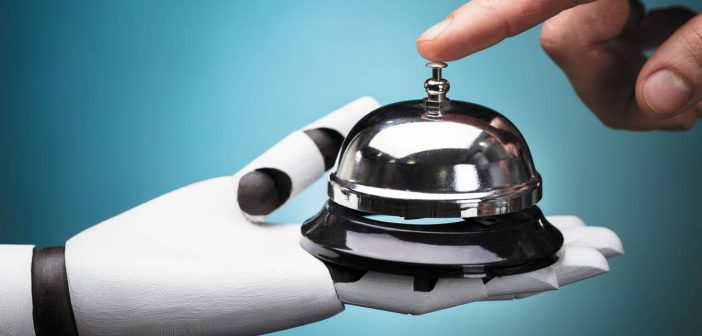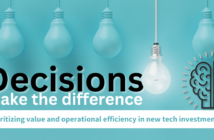by Fiona Soltes
Yani Deros has moved hotel mattresses and dug under desks to find an outlet for charging his devices.
Tom Moore has found himself wary of hotel WiFi security.
And Michael Driedger has touched what looked to be a light switch at a property in Riyadh, and found it opened the curtains instead. He also delighted in a record player at a boutique hotel – until he noticed it was connected through Bluetooth, switching the sound from analog to digital and ruining its quality.
Regardless of good intentions, the introduction of technology, or the ability to power it, sometimes misses the mark. Loyalty programs can go too far with familiarity and become creepy. There’s the realization that a virtual assistant in a hotel room, though convenient, is always listening. Guests may be able to go straight to their rooms using a special code, but they still end up at the front desk asking if they missed a step. And then there are those who gain access to the property with a digital key app, but their phone has died.
The definition – and expectation – of a great customer experience certainly has changed over time. Individuals increasingly receive instant and personalized service everywhere else, so why not at hotels? Hotels, in turn, are attempting to apply what works in a home capacity to the commercial environment, often with mixed results.
“Today’s hoteliers are under pressure to adapt to a new breed of guest whose needs and demands are entirely different than those of previous generations,” said Deros, CEO and cofounder of CIRQ+, a platform that turns hotel rooms into smart spaces by allowing guests to seamlessly operate the thermostat and lights as well as charge their devices and more. “The customer experience is no longer just about quality service and a clean and comfortable room; it’s about the entire customer journey.”
That’s especially true with the tech-dependent millennial generation, he said; more than 70 percent of them, according to an Eventbrite/Harris Poll study, would prefer to spend on a desirable experience rather than a desirable product. Keep in mind that they’re now the largest living generation, and a sea-change is underway.
“Properties are realizing they are severely lagging behind the times with technology adoptions and are scrambling to find solutions to update and modernize their rooms,” he said. “As Internet of Things (IoT) or smart technology accelerates in the marketplace, we are seeing that room control systems are the fastest-growing trends in the industry, surpassing wireless door locks and connective TVs.”
“Most hospitality brands recognize that making a guest feel important and appreciated can go a long way,” Deros said. As technology continues to evolve, however, “brands will be required to gather and leverage big data to automate personalization and drive loyalty.”
So how do they do that, exactly, without potentially negatively impacting the guest experience?
Driedger is a green building consultant in addition to CEO and cofounder of Operto, which offers keyless entry and self-check-in software solutions. Positive experiences with technology, he said, begin with understanding what tools are right for what spaces. A learning thermostat such as Nest, for example, might be a joy in an individual home, but not provide the same benefits when it has to “relearn” every hotel guest. And then there was that light switch in Riyadh. “That’s a mistake that people make in trying to automate things,” he said. “They change what the expected human interface would be. The interface has to be super-simple.” If it’s not clear and relevant to the large majority of guests, it doesn’t matter how exciting or advanced the technology is.
Operto allows guests in rental, hotel, and other properties to check themselves in and out using unique codes for each booking. The dashboard allows properties to see who has accessed rooms and when; eliminate guest lock-outs from failed keys; adjust temperature settings based on occupancy; increase revenue by allowing early check-ins and late-night bookings; and cut down on lines at the front desk. Automation, after all, can lead to efficiency.
Granted, getting guests accustomed to the idea of not having to go to the front desk will take some time. Even though using Operto’s keyless entry is the equivalent of “punching in a code” as when using an ATM, Driedger said, in the early days, some properties had up to 80 percent of guests asking if that’s still all they needed to do.
“It can be hard to get used to,” he said. “It does take time. But it’s all about communicating. If you’re not communicating change to people, it can be unnerving.” Over time, that 80 percent dropped to 50, and then to 20. “And now that people understand, the ease and quickness of not having to line up at the front desk is a key driver for return guests.”
It’s an important point. The best way to introduce new technology – assuming it’s the right technology, naturally – may be to ensure that its presence, purpose, and benefits are clearly shared.
Moore, retail and hospitality industry lead for Zebra Technologies, said hoteliers have to be “very methodical in how they engage with their guests.” Some ideas that appeared promising in the past – take the use of beacons to provide location-based services, for example – haven’t panned out the way people expected. Issues of privacy and security have continued to be paramount, even as guests expect personalization.
Zebra works across numerous industries in a variety of ways. In the hospitality realm, Zebra endeavors to help properties provide seamless and streamlined experiences to guests by empowering staff to communicate through mobile computers and Workforce Connect software, whether by phone, text, or push-to-talk. Zebra also offers a software security solution called LifeGuard for Android, extending the service life of Zebra’s Android-based devices three to five years beyond consumer operating system support with extended security support, and predictable periodic security updates.
At the end of the day, he said, there’s a balancing act. Technologies aim to focus on the guest, but also on the staff and how they can help the guest with less friction from the guest perspective.
“The other thing, the big challenge, is how do I make sure my staff is in the right places to serve the guest?” he asked. With larger properties in particular, being able to dispatch the task to the worker closest to the guest can lead to a better experience. In that case, location-based sensors can be a boon, especially if some automation is involved.
In his view, it’s the check-in process that is still “stuck” in terms of streamlining and technological efficiency.
Micah Solomon, customer service consultant and speaker, said technology that feels intrusive and isn’t offered as a choice can “very quickly” destroy the hospitality experience, especially a luxury one. Solomon, who wrote The Heart of Hospitality: Great Hotel and Restaurant Leaders Share Their Secrets, brings up check-in kiosks of the past, and how some brands pressured guests to use them rather than be greeted by a person. That bombed, he said, but other hotels are starting to get things right. He points to European brand Citizen M, for example, which offers a human-assisted kiosk check-in instead. Solomon also offers a “Jetsons Test,” based on the 1960s TV show, to help companies determine when humans add value – and when they just get in the way. Among the considerations: whether a person can do a job more efficiently, effectively – or warmly – than a machine.
“Without the human touch, properly applied,” he said, “we quickly become a commodity.”




